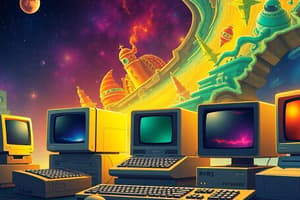Podcast
Questions and Answers
What was the original definition of the term 'computer'?
What was the original definition of the term 'computer'?
- A person responsible for performing mathematical calculations (correct)
- A machine capable of handling an array of tasks ranging from basic arithmetic to complex simulations
- An electronic device designed to process, store, and display information
- A device that represents and manipulates data using binary code
Which of the following is a key characteristic of modern digital electronic computers?
Which of the following is a key characteristic of modern digital electronic computers?
- They rely on decimal code to represent and manipulate data
- They use binary code consisting of zeros and ones (bits) to represent and manipulate data (correct)
- They are limited to basic arithmetic operations
- They use analog signals to represent and process information
Which of the following technological advancements enabled smaller and more efficient computing devices?
Which of the following technological advancements enabled smaller and more efficient computing devices?
- The invention of transistors in the late 1950s (correct)
- The development of mechanical calculators
- The invention of vacuum tube-based computers in the 1940s
- The invention of analog computers
What is the primary impact of the ability of computers to process large amounts of data quickly?
What is the primary impact of the ability of computers to process large amounts of data quickly?
Which of the following devices represents the earliest form of computing technology mentioned in the text?
Which of the following devices represents the earliest form of computing technology mentioned in the text?
What is the key difference between analog and digital computers?
What is the key difference between analog and digital computers?
Which of the following is NOT a recent development in computer technology mentioned in the text?
Which of the following is NOT a recent development in computer technology mentioned in the text?
What impact did the personal computing revolution have on the accessibility of computers?
What impact did the personal computing revolution have on the accessibility of computers?
Which of the following ethical considerations is NOT mentioned in the text as arising from the increasing integration of computers into our lives?
Which of the following ethical considerations is NOT mentioned in the text as arising from the increasing integration of computers into our lives?
What is the primary function of computers as described in the text?
What is the primary function of computers as described in the text?
Flashcards are hidden until you start studying
Study Notes
Understanding Computers
Introduction
The term "computer," originally defined as a person responsible for performing mathematical calculations, has evolved significantly since the advent of electronic digital computers in the mid-20th century. Today, when we refer to a computer, we mean an electronic device designed to process, store, and display information. In this article, we will delve deeper into the concept of the computer, exploring its various aspects, evolution, and impact on society.
Modern Digital Electronic Computers
Modern digital electronic computers rely on binary code, consisting of zeros and ones (bits), to represent and manipulate data. These computers are versatile, capable of handling an array of tasks ranging from basic arithmetic operations to complex scientific simulations. Their ability to process large amounts of data quickly has led to significant advancements in fields such as meteorology, telecommunications, and medicine.
History of Computing
The history of computing spans several centuries, starting with the invention of the abacus by the Chinese and evolving through mechanical calculators and analog computers to digital computers. The digital era began with the development of vacuum tube-based computers in the 1940s and continued with the invention of transistors in the late 1950s, enabling smaller and more efficient computing devices.
Analog Computers vs Digital Computers
Analog computers use continuous physical magnitudes, while digital computers represent information in discrete form. Although analog computers have been largely replaced by digital ones, they still hold advantages such as faster real-time computation for certain applications.
Advancements in Computer Technology
The field of computer technology continues to advance rapidly, with developments such as quantum computing, artificial intelligence, machine learning, and virtual reality pushing the boundaries of what computers can do.
Personal Computing Revolution
With the advent of personal computers in the 1970s and subsequent advances in miniaturization and affordability, computing became accessible to individuals and businesses worldwide. Today, computers come in various forms, from powerful supercomputers to mobile devices like laptops and smartphones.
Ethics and Social Impact
As computers become increasingly integrated into our lives, ethical considerations arise, such as privacy concerns, algorithmic bias, and the impact of automation on the workforce.
In summary, computers are programmable devices designed to process, store, and display information. They have revolutionized numerous aspects of society, from scientific research to everyday communication. Understanding the principles and evolution of computers provides insights into their transformative power and challenges us to consider their potential implications for the future.
Studying That Suits You
Use AI to generate personalized quizzes and flashcards to suit your learning preferences.




